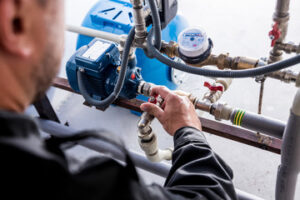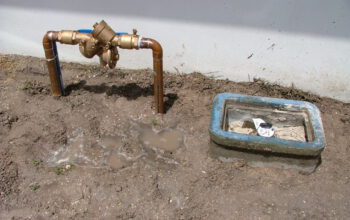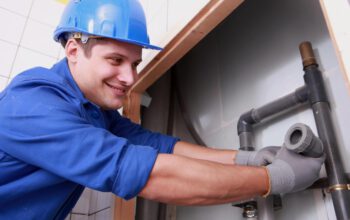A commercial plumber is a specialized plumber that works on larger buildings like offices, restaurants, and medical facilities. The job requires them to deal with higher-risk plumbing situations, such as leaky taps or clogged drains.
Akron Plumber understands the role of gravity in their pipes. They also follow blueprint designs and have basic carpentry skills when needing to access or brace pipes inside walls.

While a residential plumber can handle the plumbing in your home, a commercial plumber is needed for larger buildings such as office buildings, schools, retail stores and warehouses. Commercial plumbers are trained to work on a wider variety of plumbing issues than their residential counterparts and have more experience working on bigger projects such as sewage systems and water mains.
A commercial plumbing system is much larger than a residential plumbing system and requires more knowledge of how to install and maintain. Because of this, it’s important to choose a commercial plumber with plenty of experience in the field. You can also ask to see examples of their past work and read reviews online to get an idea of the type of plumbing services they offer.
In addition to the extra size and complexity of a commercial plumbing system, the pipes are usually made from thicker materials than those used in homes. This creates a greater risk of damage and may require more frequent maintenance and repair. A good commercial plumber will be able to identify these problems and provide solutions that will keep the plumbing in your business running smoothly.
Another thing to consider when choosing a commercial plumber is their ability to work well with other tradespeople. Commercial plumbing jobs are often more complicated than residential projects and will require a team of people to ensure the project is completed on time and within budget. A skilled and experienced commercial plumber will be able to work with other tradespeople and communicate clearly with them to avoid any delays or issues.
A plumbing problem in a commercial building can be extremely disruptive to a business. Not only does it stop customers and employees from getting what they need, but it can also cost the company money. Sewage blockages, silent leaks and low water pressure can be a real pain for any business, and it’s important to find a plumber who can get the job done quickly and efficiently. A quality commercial plumber will be able to handle any plumbing issue in your business, no matter how big or small.
As a commercial plumber, you’ll work on plumbing systems and services on a much bigger scale than a residential one. This includes a variety of businesses, restaurants, and public spaces such as malls. Commercial plumbers work with complex and extensive pipe and plumbing systems that need to be up to code for all of the people using them.
To become a commercial plumber, you’ll need to get the proper training and licensing for your area. This may be through a trade school program, an apprenticeship, or both. A typical apprenticeship lasts 4-5 years and is a combination of classroom learning and hands-on experience. Then, you’ll need to pass the journeyman plumber exam to earn your license.
Most states have varying requirements for their licenses, so it’s important to check with your local city and state before pursuing any plumbing work. In for example, you’ll need a contract license and a journeyman plumber’s license. The first requires four years of journeyman level work and 576 hours of approved education. The second requires five years of experience, including at least one year working as a licensed journeyman, and an exam. Some localities require other qualifications, such as a business license and a permit for underground utility work.
Some cities and states also require continuing education for plumbers to keep their licensing. This ensures that you’re up to date with the latest changes in your field and can continue providing quality service for your clients.
Commercial plumbing can be a very challenging career. You need to be a jack-of-all-trades and know your way around large buildings and complicated plumbing systems that serve multiple tenants. In addition, you’ll need to be flexible as you often work in places that can’t be closed while you do repairs.
As a commercial plumber, you can expect to make a good living as long as you follow all the necessary rules for your area. To maximize your earning potential, consider pursuing other certifications, such as ASSE or National Inspection Testing and Certification, which can help you stand out to employers. You can also use a field service management tool like BuildOps to manage your entire operation, from scheduling and dispatching to invoicing and accounting.
In order to become a commercial plumber, you must first complete an apprenticeship program and then pass an exam. You also need to have two years of experience as a licensed journeyperson. During this time, you must have worked in plumbing, construction, or remodeling for at least 4,000 hours. In addition, you must have passed a business and law exam. You can substitute directly related academic or technical training for up to one-half of the required experience.
Commercial plumbing involves a more complex and extensive pipework system than residential plumbing. This is because many businesses require multiple stories of sinks, toilets and other plumbing fixtures, as well as high water pressure systems. This means that a commercial plumber needs to be well-versed in the various codes and regulations for each building type and have the ability to design, install and repair plumbing systems of this size.
Additionally, a successful commercial plumber will know how to work with multiple tradespeople in order to keep up with project timelines and stick to a budget. For example, he or she will be able to collaborate with HVAC and carpenters to make sure that the pipes are properly installed and secured for each job.
In order to obtain a master plumber’s license, you must have at least seven years of experience in commercial or industrial plumbing, including the installation, replacement, maintenance and repair of pipes and other similar apparatus for the conveyance of water or gas. You must also have the ability to perform backflow testing and maintenance, install sewage treatment plants and other related equipment. You must also take eight hours of continuing education instruction yearly in order to maintain your license.
Commercial plumbers must be familiar with different building codes, including those for electrical, fire safety and structural integrity. In addition, they must be able to work with a variety of materials, such as copper and PVC piping, and know how to solder and braze. They must also be able to follow blueprints and adhere to strict specifications for each job. Finally, a successful commercial plumber will be able to negotiate with clients about costs and payment schedules.
Many states require commercial plumbers to have insurance before they work on a project. This typically includes general liability, business auto, workers’ compensation and tools and equipment coverage. This ensures the client that the plumber will be covered in case of an accident. It also protects the plumber in case a claim is filed against them by a third party.
A commercial plumbing business usually has multiple employees, so a workers’ compensation policy is necessary. It covers medical bills and lost wages in the event of an accident on the job. Additionally, this type of insurance may cover legal costs in the event an employee files a lawsuit against the company.
Commercial general liability insurance protects against claims made against the business, including bodily injury and property damage. This can include accidents that occur in the course of working at a client’s location, such as when a worker accidentally breaks a window or tarnishes a sink. It can also include a claim made against the business for a damaged product, such as when a newly installed faucet causes water damage in a customer’s home.
Business property insurance is an optional addition to a general liability policy that covers the cost of repairs or replacements for your business’ property. For example, if your plumbing business rents a shop and the building is damaged by fire, this type of insurance will cover the cost to repair or rebuild. It is also common for plumbing companies to purchase pollution liability insurance, which is an add-on to a general liability policy that covers damages due to pollution-related incidents.
Insurance premiums are based on a variety of factors, including the risk assessment done by the insurance agency and your personal information. This information can include your age, marital status and credit score. In addition, the number of employees, revenue and sales can impact your premium rate. To get the best quote possible, speak with a licensed insurance agent. They can help you compare rates from multiple companies to find the right policy for your needs. In addition, some companies offer a business insurance package that bundles several types of insurance into one affordable policy.


